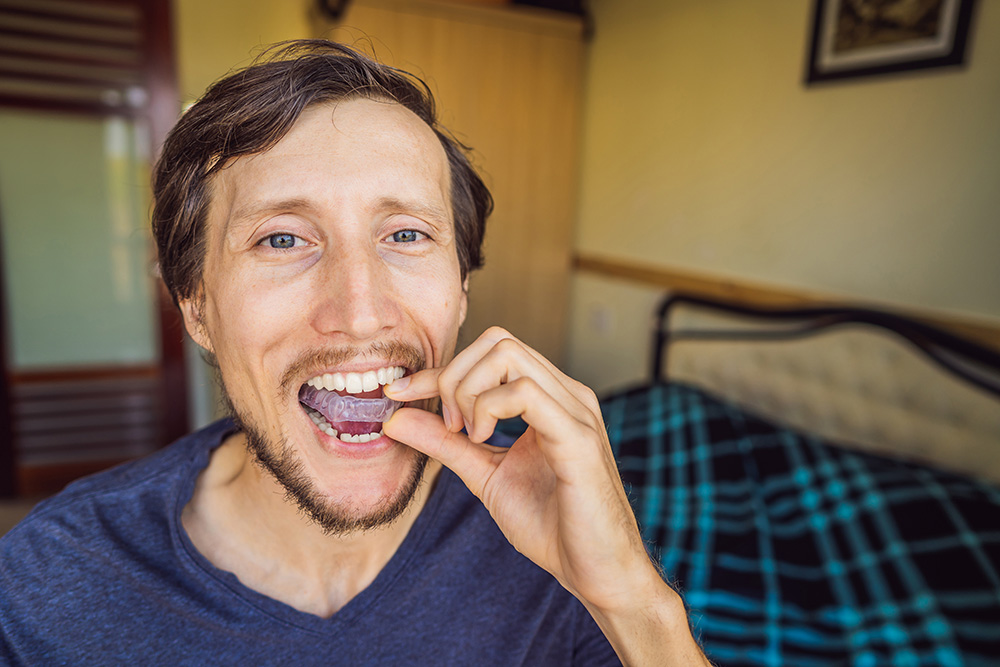Nightguards

When you imagine all the ways you can protect your teeth from harm, you most likely think about avoiding sugary foods, not chewing on ice, and wearing an athletic mouthguard. In other words, you probably think about the damage that can occur when you’re awake. If, however, you have a condition called sleep bruxism, then you might be doing a lot of damage to your teeth while you sleep.
What Is Sleep Bruxism?
Sleep bruxism is a condition where individuals frequently grind their teeth or clench their jaws while they sleep.
People who suffer from sleep bruxism put an excessive amount of wear and tear on their teeth while they sleep, and they also often suffer from painful musculoskeletal problems.
How To Know If You Have Sleep Bruxism (Signs and Symptoms)
Sometimes, it can be difficult to tell if you have sleep bruxism because the teeth grinding and jaw clenching happen when you are not conscious.
There are, however, some telltale signs and symptoms of sleep bruxism that indicate your teeth and jaws might be doing more work than you realize. These include:
- Teeth sensitivity
- Receding gums
- Jaw pain or stiffness
- Neck, face, teeth, or ear pain
- Frequent headaches or migraines
- Depressions in your cheeks or tongue
- Enamel that’s worn in certain patterns
- Cracked or chipped teeth
If you experience any of these symptoms, we recommend scheduling a dental checkup to get a verified sleep bruxism diagnosis and talk with a dentist about treatment options.
What Causes Sleep Bruxism?
The exact cause of sleep bruxism is not known. However, several factors can make a person more likely to have sleep bruxism.
Risk factors for sleep bruxism include:
- Daytime stress and anxiety
- Genetics
- Temporomandibular joint disorder
- Malocclusion or misaligned jaw
- Sleep apnea
- Alcohol consumption
Since it’s not always clear what exactly causes sleep bruxism, it’s often recommended that people who clench their jaws and grind their teeth take steps to reduce stress and anxiety – especially before going to sleep. Strategies include meditation, therapy, exercise, and creating a positive bedtime routine that helps you unwind and shake off the day’s stress before tucking in.
Protecting Your Teeth With a Custom-Made Nightguard
Although it is not always possible to stop sleep bruxism completely, you can protect your teeth from the damage that frequent grinding and clenching can do by wearing a nightguard.
A nightguard is a plastic guard worn over your teeth that can be designed to protect them from grinding while also helping to prevent clenching. Our dentist can help you determine whether you need a nightguard for just grinding or grinding and clenching based on the wear patterns of your teeth.
What To Expect When Getting a Nightguard
Nightguards are custom-designed for each patient to fit perfectly and comfortably and do not disturb sleep. The process begins with an evaluation of the patient’s teeth, jaw, jaw alignment, and bite to determine the type of nightguard needed.
We then take a digital scan of the patient’s mouth to create a three-dimensional oral impression (without the need for sticky molding trays). This impression is then used to design a custom nightguard manufactured specifically to each patient’s unique specifications.
Sleep Bruxism Treatment in Bucyrus
To learn more about sleep bruxism, the conditions that cause it, and whether you should be protecting your teeth with a nightguard, we welcome you to contact Oakwood Dental in Bucyrus today.

 Meet Dr. Michelle Nagy
Meet Dr. Michelle Nagy Meet Dr. Attila Nagy
Meet Dr. Attila Nagy